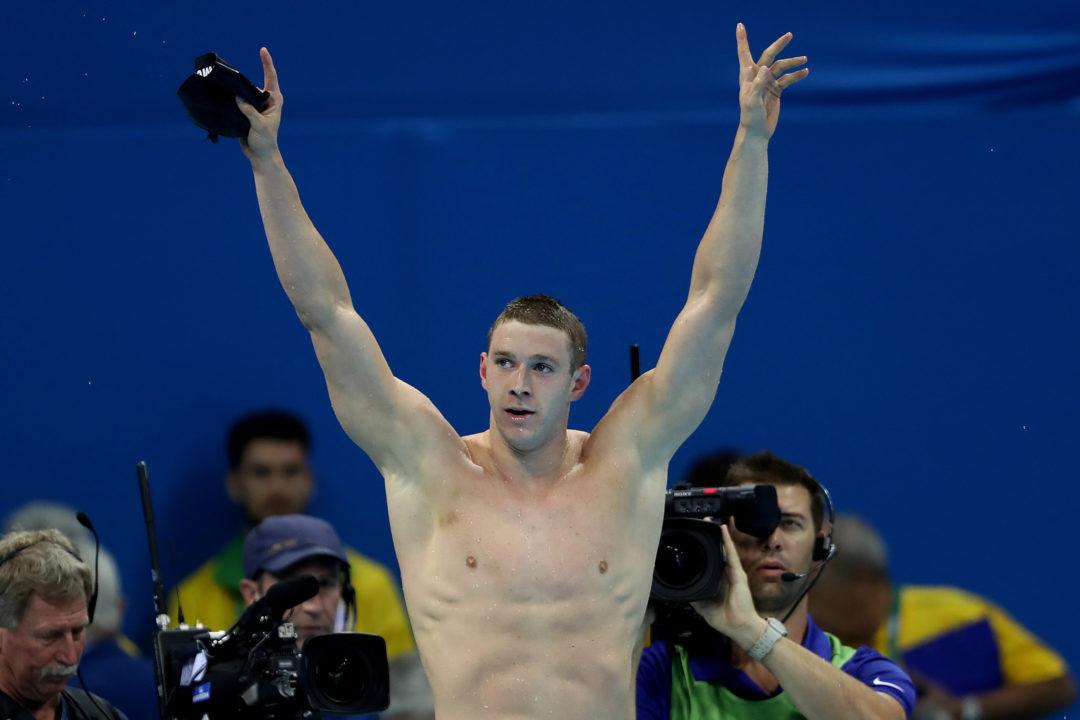The Dominance Series Sponsored by SwimSpray, a SwimSwam partner.
Breaking new ground–heroic dominance comes in many forms in Days 5 and 6…
Night Five:
There is a new kid in town. Four years ago, Nathan Adrian won the 100 free by the slimmest of margins – 0.01 seconds. In Rio, Kyle Chalmers didn’t just upset the field, his 47.58 gold medal time was (relatively) dominant. With a scorching backhalf, Chalmers dominated the field by 0.46% – the largest margin of victory of any night five final.
Kyle Chalmers also dominated his own World Junior Record by 0.95% (his record stood at 48.03 coming into this meet). However, one WJR fell by an even bigger margin: Canadian wunderkind Penny Oleksiak dropped a huge 1.12% off her own record through the semifinals of the 100 free.
Two National Records that were thoroughly dominated by medalists last night include Pieter Timmers’ 47.80 in the 100 free (cut 0.88% off the Belgian record), and Canada’s women’s 4×200 FR (cut 0.81% off the Canadian Record).
Note: the gold medalist’s margin of victory:
- Women’s 200 fly: Mireia Belmonte 0.02%
- Men’s 200 breast: Dmitry Balandin 0.05%
- Men’s 100 free: Kyle Chalmers 0.46%
- Women’s 4×200 FR: USA 0.40%
Day Six
Regarding 31-year-old Michael Phelps, conventional wisdom has been that while he would certainly collect some medals at these Olympics, but his days of completely dominating Olympic finals would be a thing of the past. That idea was proven wrong in the 200 IM, where Phelps used a monster freestyle leg to utterly dominate the field, like it was 2008 again. His time of 1:54.66 was among his best ever, and he blew away the competition by nearly 2 seconds, or a 1.70% dominance margin.
That race was historic for all sorts of reasons, from the first Olympic 4-peat, to an astounding 22 gold medal for Phelps, to breaking a literally ancient record of 12 individual golds set by Leonidas of Rhodes (https://staging.swimswam.com/phelps-ties-2000-year-old-olympic-record/). Phelps’ swim was the most dominant of the night, and the most dominant since the second day of these games (when Adam Peaty and Katie Ledecky broke world records https://staging.swimswam.com/swimmers-define-dominance-in-rio/).
Not to be completely overshadowed, Rie Kaneto of Japan turned in a dominant 200 breast. Her 2:20.30 time won by a second and a half, and with a dominance margin of 1.19%, she joins an ultra-elite group of gold medalists who have won their event by over 1% in Rio. (The others are Katinka Hosszu – 400 IM, Sarah Sjotrom – 100 Fly, Katie Ledecky – 400 Free, Adam Peaty – 100 Breast, and Phelps – 200 IM).
Finally, an honorable mention for dominating one’s personal best goes to Simone Manuel (USA) and Penny Oleksiak (CAN). The co-gold medalists came into these games seeded 9th and 8th in the 100 free, respectively. Both swimmers had to drop just over 1% from their lifetime bests in order to get the gold in 52.70 and upset Australia’s Campbell sisters. They now co-own the North American Record.
Thursday night was a fun one, watching swimmers dominate their competition and dominate expectations.
Note: the gold medalist’s margin of victory:
- Men’s 200 Back: Ryan Murphy (USA) 0.30%
- Women’s 200 Breast: Rie Kaneto (JPN) 1.19%
- Men’s 200 IM: Michael Phelps (USA) 1.70%
- Women’s 100 Free: Simone Manuel (USA) / Penny Oleksiak (CAN) 0.00% (both were 0.55% ahead of 3rd)
“The Dominance Series” is sponsored by SwimSpray-dominating the competition when it comes to chlorine removal; and compiled by Travis Knop, Aimee Schmitt and Andrew Chadeayne.

